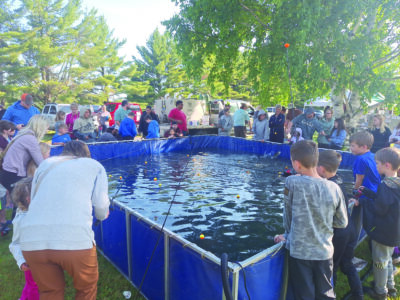SUD is a public health crisis that needs more public awareness
HOUGHTON — The Western Upper Peninsula Health Department (WUPHD) has expanded into addressing Substance Use Disorder (SUD), both as a disorder and a brain disease, in the community, because SUD, as a brain disease has reached a public health crisis, worldwide, across the nation, and in the Copper Country.
“Addiction is now considered a chronic, relapsing, life-threatening disease,” said Gail Ploe, Health Education Coordinator at WUPHD. “And so, if you, or anyone else, is interested in learning more about addiction as a disease, you can literally look at the Surgeon General’s report in 2016. He released a very lengthy report called Facing Addiction in America, and that report definitively ends the argument once and for all of whether or not addiction, or Substance Use Disorder, is a disease.”
The report Ploe is referring to is the U.S. Department of Health and Human Services, Office of the Surgeon General released the results of a study, published as The Surgeon General’s Report on Alcohol, Drugs, and Health in 2016, states, on pages 1-6:
“Addiction: The most severe form of substance use disorder, associated with compulsive or uncontrolled use of one or more substances. Addiction is a chronic brain disease that has the potential for both recurrence (relapse) and recovery.”
Ploe said SUD fits the medical model on several levels.
“There is an organ, it’s your brain; it has a defect; and you have symptoms,” she said. “And sometimes those symptoms are unpleasant — people do and say things that they normally wouldn’t do in the midst of addiction, but it’s treatable.”
Once somebody gets into treatment and gets help, she explained, they return to being a productive member of society, “and those symptoms, those awful things we hate: the lying, the dishonesty, the cheating, stealing, neglecting your children — those go away, because people get better. They get better.”
The Surgeon General’s report goes on to state that “Research on alcohol and drug use, and addiction, has led to an increase of knowledge and to one clear conclusion: Addiction to alcohol or drugs is a chronic but treatable brain disease that requires medical intervention, not moral judgment.”
The moral judgement the report mentions is something of which Ploe is keenly aware. She referred to an old saying: “What gets people into treatment? Livers, lovers, and lawyers.” It is a saying in reference to the moral judgements, public shaming and stigma aimed at those who want to seek treatment. The public’s views of those suffering with SUD and those wanting to overcome it, are actually barriers to seeking or receiving help, until it is too late. The consequences are the loss of physical health, wives and families and/or court hearings.
“We have to get to a point,” Ploe said, “where what gets people into treatment is that they understand, on some level, that ‘I’m out of control and I need some help’ or ‘I’m starting to take too many pain pills,’ or ‘I drink too much.’ And there’s no shame, there’s no stigma that they could actually access care early in the process, before things get really bad, and they could say, ‘Hey, I need some help.’ They could tell their doctor or they could tell a family member, and they would understand ‘hey, here’s where I get help, here’s where I go to get help, and I can enter that system without fear of judgement, without fear of shame.”
Added to the social stigma, the recent pandemic and subsequent lockdowns that forced people into isolation only exacerbated the problem.
“This is an epidemic within the pandemic,” said Ploe. “In 2020, we lost 93,000 people to drug overdose. That’s more than we lost at the height of, at the top of, the opioid crisis.”
To put that figure into perspective, the population of Houghton County is 36,000.
“We know that Substance Use Disorder and Mental Health issues do not get better in isolation,” Ploe pointed out. “People need connection, they need community. They need treatment. Then, in the middle of the pandemic, being isolated has exacerbated Substance Use Disorder and mental health issues, and we’ve lost far too many people.”
While addiction is a disease, it is treatable. It is not curable, but it is treatable. To accomplish treatment, said Ploe, to make treatment and recovery more accessible, as well as more successful, requires community understanding, compassion and support.
“It is preventable,” said Ploe. “But the only way people are going to get help (is) we provide a safe space for them to be honest about their alcohol and/or drug use, without judgement, without stigma.”
There is no such thing as a disposable person, Ploe said. The Health Dept. is part of the FACE program, which did an enormous community assessment that focuses on SUD. For the assessment, Ploe said she conducted more than 20 key-informant interviews, where she spent 30 to 90 minutes talking with people, one of whom was Judge Mark Wisti.
“I asked him what we can do to help people with SUD in our community. His first comment was ‘we can start by not calling them names.’ You know, we call them ‘junkies’ and ‘drunks’ and it just increases stigma and creates barriers to people getting help.”
Ploe said an important message she is trying to get out to the public is that those suffering with SUD are members of the community, not strangers. When the public labels “junkies” and “drunks,” they are not talking about are not “those people.”
“The people who are suffering with Substance Use Disorder are not ‘those people,'” she said. “They’re our husbands, and our daughters, and our neighbors, and our friends, and you know, (it’s time) to remove that barrier, and to really, truly step into the arena and start helping people. That’s what the Health Department’s trying to do.”
The Surgeon General’s report is available at https://addiction.surgeongeneral.gov/sites/default/files/surgeon-generals-report.pdf.





